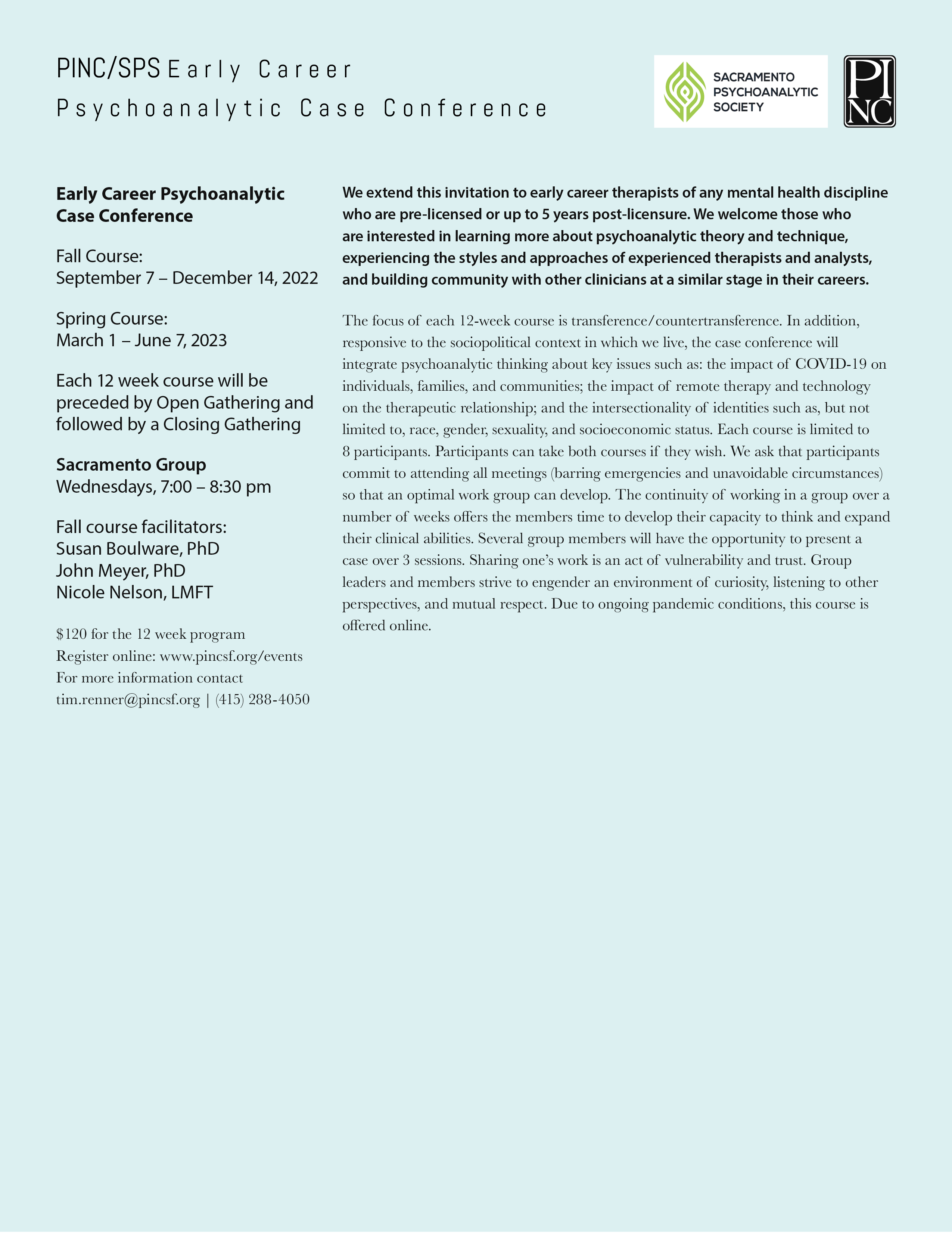SPS PINC Early Career Psychoanalytic Case Conference
SPS PINC Early Career Psychoanalytic Case Conference
Susan Boulware, PhD; John Meyer, PhD; Nicole Nelson, LMFT
Begins Wednesday Sep 7, 7:00 PM – 8:30 PM, 12 sessions until Dec 14
We extend this invitation to early career therapists of any mental health discipline who are pre-licensed or up to 5 years post-licensure. We welcome those who are interested in learning more about psychoanalytic theory and technique, experiencing the styles and approaches of experienced therapists and analysts, and building community with other clinicians at a similar stage in their careers.
 The focus of each 12-week course is transference/countertransference. In addition, responsive to the sociopolitical context in which we live, the case conference will integrate psychoanalytic thinking about key issues such as: the impact of COVID-19 on individuals, families, and communities; the impact of remote therapy and technology on the therapeutic relationship; and the intersectionality of identities such as, but not limited to, race, gender, sexuality, and socioeconomic status. Each course is limited to 8 participants. Participants can take both courses if they wish. We ask that participants commit to attending all meetings (barring emergencies and unavoidable circumstances) so that an optimal work group can develop. The continuity of working in a group over a number of weeks offers the members time to develop their capacity to think and expand their clinical abilities. Several group members will have the opportunity to present a case over 3 sessions. Sharing one’s work is an act of vulnerability and trust. Group leaders and members strive to engender an environment of curiosity, listening to other perspectives, and mutual respect. Due to ongoing pandemic conditions, this course is offered online.
The focus of each 12-week course is transference/countertransference. In addition, responsive to the sociopolitical context in which we live, the case conference will integrate psychoanalytic thinking about key issues such as: the impact of COVID-19 on individuals, families, and communities; the impact of remote therapy and technology on the therapeutic relationship; and the intersectionality of identities such as, but not limited to, race, gender, sexuality, and socioeconomic status. Each course is limited to 8 participants. Participants can take both courses if they wish. We ask that participants commit to attending all meetings (barring emergencies and unavoidable circumstances) so that an optimal work group can develop. The continuity of working in a group over a number of weeks offers the members time to develop their capacity to think and expand their clinical abilities. Several group members will have the opportunity to present a case over 3 sessions. Sharing one’s work is an act of vulnerability and trust. Group leaders and members strive to engender an environment of curiosity, listening to other perspectives, and mutual respect. Due to ongoing pandemic conditions, this course is offered online.
CE Credits offered: 18
Course Objectives
After completing this course participants will be able to:
- Evaluate the request for psychotherapy and whether the circumstances of the referral will lead to the start of treatment.
- Name and delineate three different ways to take a client history.
- Compare and contrast the psychoanalytic concepts of transference and countertransference as defined and presented by each facilitator.
- Highlight and articulate the impact of the client’s unique history on the class participants, both individually and as a group.
- List and describe the emotions, thoughts, and concerns that are evoked by the client’s narrative in terms of identifications and countertransference projections.
- Assess how gender and sexuality impact the countertransference experience of the therapist and the group.
- Track and articulate how the presenting therapist’s and the group’s experience of the client changes from beginning to the end of the presentation as case material progresses.
- Determine the ways in which countertransference responses of the therapist and group are affected by the stage of the client’s treatment such that participants can name each stage across an entire therapy.
- Identify and explore the feelings, fantasies, and anxieties in the client narratives.
- Utilize the therapist’s and the group’s imagery and free associations to deepen their understanding of the client and their responses to the client.
- Analyze the leading anxieties and defenses against these anxieties presented by the client.
- Name and describe each different diagnostic category presented in the case material and ways in which it impacts participants' perceptions of the case.
- Delineate ways to use countertransference responses to foster and maintain empathy with severe diagnostic features present.
- Learn how the different theoretical orientations have an impact on the handling of resistance, interpretation, and the therapist/patient relationship.
- Discuss and define projective identification in terms of how the client’s narrative can be referring to their experience of the therapist in the moment.
- Differentiate the various defense mechanisms the patient uses to deal with anxiety and fear, (i.e. repression, splitting, acting out, etc.), and develop strategies to facilitate the psychotherapy process.
- Explain the importance of the frame that is the management of time and fee and its possible transgressions.
pincsf.org/events – 415-288-4050 — 530 Bush St, Suite 700, SF CA USA — pincsf@gmail.com
The Psychoanalytic Institute of Northern California (PINC) is approved by the American Psychological Association to sponsor continuing education for psychologists. PINC maintains responsibility for this program and its content. Visit pincsf.org/policies for policies and disclaimers.
Sacramento, CA
United States
| Case Conference | $ 120.00 |
| CE Credits (18) | $ 90.00 |
